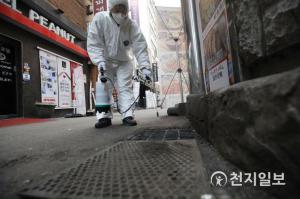Why the Korean Government is Obsessed with the Shincheonji Members who Traveled to Wuhan?
Are Shincheonji’s 42 members with a record of visiting Wuhan the main cause of the spread of the coronavirus outbreak in Korea?
NEW YORK, NEW YORK, UNITED STATES, March 3, 2020 /EINPresswire.com/ -- The South Korean Ministry of Justice reported on Saturday February 29 that after reviewing travel records, 42 members of the Shincheonji Church of Jesus (Shincheonji) were found to have travelled to Wuhan, Hubei Province in China, where the coronavirus outbreak began. This knowledge could help authorities determine how Shincheonji came to be at the centre of a spike in novel coronavirus cases in Korea, said Kwon Joon-wook, a spokesperson from the South Korean Center for Disease Control and Prevention.As of March 2, 56.5% of cases in South Korea were linked to the Shincheonji (2,113 out of a total of 3,736 confirmed cases of the coronavirus). The woman referred to as Patient 31 is a member of the Daegu branch of the church and the first confirmed case in that area. She visited the church on February 9 and 16 to attend service. Since then, the number of confirmed cases spiked dramatically in Korea. They are mainly congregation members of Shincheonji. That is why the government had been focusing heavily on the movement of the members.
However, are Shincheonji’s 42 members with a record of visiting Wuhan the main cause of the spread of the coronavirus outbreak in Korea? The Ministry of Justice searched for travel records between July 1, 2019 and February 27, 2020. The dates include immigration before December, 2019 when the first coronavirus case was confirmed in Wuhan.
Among the 42 people, one member came from Wuhan on January 8, 2020, but that person was found negative on a coronavirus scan, and did not attend service at Shinchonji Daegu church. In a public press conference held on March 2, Shincheonji promised to cooperate actively in accordance with the government's policy, as the entire membership list has already been handed over to the government. Some believe that investigation on Wuhan immigration records should not be limited to members of Shincheonji Church, but that all citizens who have been to Wuhan should be subjected to a full investigation, as they think the investigation and reports at this point were intended to shift responsibility to one specific religious group rather than admitting the government’s failure to protect against disease.
The government argues that it has taken effective countermeasures against the outbreak, saying that the protection of the safety of the people is the top priority. But it is still accepting travelers from China. Although a travel ban was imposed on all visitors from Hubei Province, China, the number of visitors from the nine provinces in China - Canton, Henan, Zhejiang, Hunan, Anhui, Jiangxi, Shandong, Jiangsu, and Chongqing – reached 58,904 according to the data of the number of air passengers from China to Korea, said Kwak Sang-do, a member of United Future Party. The nine provinces, the coronavirus danger zones, have the highest numbers of confirmed coronavirus cases (up to 8,727) outside of Hubei Province.
On February 28 at the meeting with the delegations of the ruling and opposition parties, President Moon declared that he has no plan of banning all Chinese people entry into South Korea. He stated, "If Chinese people are completely denied entry, Koreans will be banned from entering other countries as well." President Moon also said that the number of immigrants from China has decreased 93%.
On February 27, Kang Min-seok, Blue-House spokesperson, stated, "We are strengthening the entry process for people coming from China and making visitors take thorough examinations. We are minimizing entries." As a result, Chinese immigrants are being managed stably. Since February 4, the government has implemented special immigration procedures including a separate entry hall for China, disinfection and fever checks, and a self-health screening app.
“President Moon chose the issue of Shincheonji Church as the most urgent task,” Kang said, suggesting that he would focus more on tackling coronavirus outbreak through investigating Shincheonji church members rather than through banning entry from China.
As social unrest over the spread of coronavirus outbreak continues to grow, voices of criticism towards the Korean government abandoning its responsibility are increasing. On February 28, the League of All-nations Professors for Social Justice (LAPSJ) made an official statement They stated, “Currently, South Korea is sinking as if it has become another Sewol ferry which saw hundreds of lives drown. It is now in a state of anarchy.” They sharply criticized the government’s failure to protect people from the virus and its evasion of responsibility.
Jane Jun
Cheonji News
+1 (786) 671-1366
email us here

